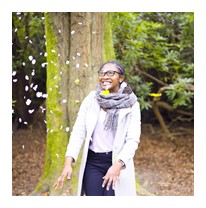 University of Oxford
University of Oxford
Twitter: @aneogbe
Theme 2: Protective Immunity
I'm investigating the T cell driven primary and protective immune response to SARS-CoV-2.
Why and when did you become interested in studying immunology?
I have always been fascinated by infectious diseases and how the body deals with them. Immunology for me is like swimming in this pool of discovery with real-life impact. Getting answers to why some people succumb to some diseases while others get better? Can we improve on nature by re-organising the ‘soldiers’ and priming them for response?
What inspires you?
Seeing how important what I do is for maintaining the integrity of the human body. The COVID-19 pandemic has reinforced this for me, and I wake up thankful that I can follow my passion.
What are your challenges?
The lack of job security and constant grant/paper rejections can be depressing. Academia can sometimes be too competitive with people working more against each other than collaboratively. Being a minority female in academia also comes with its challenges including a lack of mentorship and representation and trying to succeed in an environment not well structured or diverse enough for us.
What skills have you gained from outside academia that you use in your research?
Empathy (for self and others) and humour. Being a human face to my colleagues and laughing it off has made my job more rewarding and dry spells easier to cope with. I garden a fair bit too so that has taught me patience.
What is your passion outside of research?
Outside of work I seek things that are of a slower pace. I garden and have more than a few houseplants that I take care of. I am also a listening volunteer at Samaritans which I find very rewarding. When I can (or my partner convinces me to) I go for long hikes. Other times I watch mindless TV shows like 'Married at First Sight Australia' (it’s so good!). I recently took up painting too which is challenging but relaxing.
What does your average week look like?
My week is a mix of meetings and lab work. It gets very busy in the lab and we can be in there for ages doing various experiments or sorting out logistics for the next experiment. I also try to make time during the week for reading, data analysis and admin. The weeks feel too short but by Friday, I am completely exhausted.
What did 2020 mean to you?
2020 was the year that showed me the importance of what my colleagues and I do. I saw the strength of the collaborative model of science and the passion of scientists all over the world. We came together and did brilliant science at breakneck speed. We were all so tired, but we just kept going and what we achieved was inspirational.
What has been your most shared social media post of the pandemic?
I don’t remember, there have been a few but maybe the one where I may or may not have invented a T cell activation day (March 28th – 03/28) – I can’t believe people didn’t know this. I gained a few followers after this, so I guess I’m cool now.
